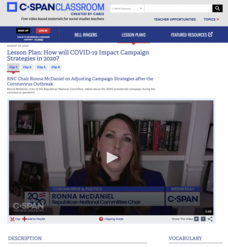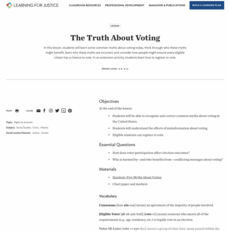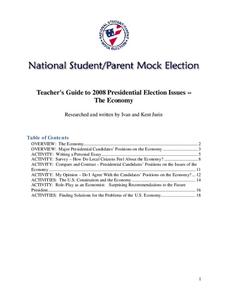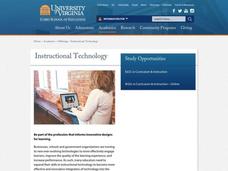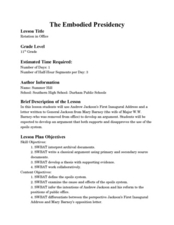Encyclopedia Britannica
Electoral College Philosophical Chairs Debate
Because of the Electoral College, it is possible to win the popular vote in a US Presidential election and still lose the election. After researching the pros and cons of the Electoral College, class members engage in a structured debate...
Encyclopedia Britannica
Election Role-Playing Debate
After watching clips of presidential candidates during debates and speeches, and researching the candidate's position on important issues, young researchers conduct a role-play debate in which they act as one of the candidates.
Encyclopedia Britannica
Election Issue Comparison Chart
As part of a study of the issues raised in the 2020 presidential election campaign, class members investigate and then create a pro-con comparison chart that reveals each candidate's position on a variety of issues.
Curated OER
Pass This Jobs Bill
It seems that print media is slowly being replaced by electronic versions. Get your kids reading the New York Times e-style. They'll read the provided article entitled, "Pass This Jobs Bill" then answer six comprehension questions. Two...
Curated OER
What if Your Parent Ran for President?
Throughout history, many people have run for president. But, what is that like for the children of those individuals? Kids read a bit about Mitt Romney and his five children, then respond to a writing prompt in a blog post. They describe...
Constitutional Rights Foundation
Elections, Money, and the First Amendment
Those who spend the most, win. Academics read informational text, participate in group discussion, and defend campaign reforms to understand the correlation between money, the First Amendment, and election results. The resource explains...
C-SPAN
How will COVID-19 Impact Campaign Strategies in 2020?
While COVID-19 has changed almost everything about daily life, it's also had a tremendous impact on the 2020 presidential contest. Using video clips featuring political advisors from both sides of the aisle, learners brainstorm what they...
iCivics
Mini-Lesson: Veto Power
No means no! Scholars analyze the impact of one of the president's most powerful tools—the veto—while also finding out ways to properly check facts for validity. They research the power of the presidential veto with paired activities and...
Encyclopedia Britannica
Campaign Photo Analysis
It's the art of the image! As part of a study of the 2020 Presidential race, groups analyze an image of a candidate, first from an objective point of view and then subjectively. They then prepare a presentation detailing what they...
Encyclopedia Britannica
Beyond a Two-Party System
Young political scientists go beyond the two-party system and research third-party candidates running in the 2020 US Presidential election. Groups present background information about the candidate, the party's platform points, and a...
National Endowment for the Humanities
A Defense of the Electoral College
Each presidential election year, the debate about the electoral college rages. Michael C. Maibach's "A Defense of the Electoral College" offers young political scientists an opportunity to examine a reasoned argument for why the...
Teaching Tolerance
The Truth About Voting
True or False: Only Presidential elections matter. Academics delve into common voting myths to understand what is true and why the election process is critical to democracy. The lesson uses group discussion, activities, and handouts to...
Curated OER
The Brief American Pageant: The American People Face a New Century
The political landscape of Y2K is the focus of this series of slides, which cover the later years of the 20th century. Charts detail the poverty and social welfare rates in the 20th century, as well as a pie graph displaying the sources...
Curated OER
Teacher's Guide to 2008 Presidential Election Issues: The Economy
Students discuss the 2008 Presidential election. They examine the significant issues of the election and focus on the economy. Students study the major issues with the economy. Students decide how they feel about each canidates' views...
Curated OER
The Presidential Nominating System
Students examine the process by which candidates for U.S. president are nominated by the Democratic and Republican parties. They identify the differences between primaries and caucuses and key terms and issues related to the primary...
Curated OER
When the Personal Becomes Presidential
Students explore American voter's attitudes toward the checkered pasts of presidents and presidential candidates. They create and conduct a survey of members of their school community and analyze the results.
Curated OER
Presidential Sweepstakes
Fifth graders visit the National Portrait Gallery to be introduced to politics, portraits, Presidents, and pretenders. They design campaign posters as a follow-up activity.
Curated OER
Comparing the President and Vice President
What are the differences in life style between the President and Vice President? Learners use this chart to help them analyze where they live, how much money they make, and which presidential team really worked together.
Curated OER
Rotation in Office
Eleventh graders explore the concept of the spoils system. In this presidential history lesson, 11th graders examine Andrew Jackson's Inaugural Address as well as a letter to him from Mary Barney in order to gain an understanding of the...
Curated OER
The Presidential Quotation Report
Famous quotations by American Presidents are the focus of this Six Trait writing activity, which could be used in a U.S. History class or in language arts. After reading the picture book Theodore by Frank Keating, have your 7th graders...
iCivics
For The President, All In A Day's Work
How does the president of the United States get the authority to exercise his/her duties? What responsibilities and tasks go into a hard day's work for the president? Here is a lesson plan that includes several instructional materials...
Annenberg Foundation
A Nation Divided
Can a presidential election cause a civil war? Learners research the events surrounding the presidential election of 1860 in a lesson that explores America's history. Using maps, videos, and primary sources, they uncover, brainstorm, and...
Curated OER
Presidential Powers
Students study and discuss the section of the Constitution that refers to the executive branch. They write a new section or clause describing a new duty for the president of the United States. Students define the word power and proposal.
Carolina K-12
The Electoral College
Is the Electoral College the best method of electing the president of the United States? Your young historians will write a persuasive essay discussing the historical perspective of the college, pros and cons, and a final argument for or...
Other popular searches
- Presidential Inauguration
- Presidential Elections
- Presidential Protection
- Presidential Duties
- Presidential Cabinet
- 2000 Presidential Election
- 2008 Presidential Elections
- Presidential Election Voting
- Presidential Biographies
- Presidential Debate
- Presidential Powers
- Presidential Campaigns








